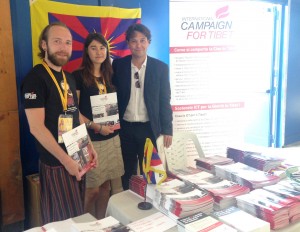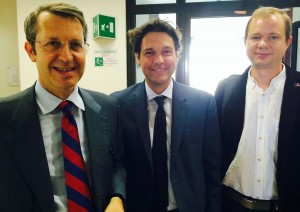 The ICT stand inside the Modigliani Forum in Livorno during His Holiness the Dalai Lama’s teachings.  Undersecretary of State Benedetto Della Vedova, Matteo Mecacci, President of the International Campaign for Tibet and EU Policy Director Vincent Metten. |
In the days preceding the teachings, I was joined by Vincent Metten, EU policy Director of ICT, to participate in several meetings in Rome, both with Government representatives and Members of Parliament. Also, in those same days, the new Italian Prime Minister, Matteo Renzi, was in China for his first visit to Beijing since he assumed power. On these issues, I published an article in an Italian newspaper (English translation), and I also held a hearing before the human rights committee of the Chamber of Deputies.
This was an important occasion to renew and reinforce the call of ICT and of its supporters worldwide to EU and democratic countries to adopt a common and principled position on the issue of Tibet while dealing with China.
Finally, in Pomaia and Livorno I had the opportunity and the privilege to spend few days with thousands of people who had gathered from all over the world to welcome His Holiness the Dalai Lama and to participate in his teachings. Elena Gaita and Joel Hirv from the ICT Brussels office joined me to distribute thousands of reports, flyers, t-shirts and other gadgets to participants.
I was there for the entire duration of the teachings and I was privileged to be part of a joyous atmosphere. Finally, I also had a non-programmed chance to speak with His Holiness the Dalai Lama about our work at ICT and his kindness was once again remarkable.
Grazie!

Matteo
